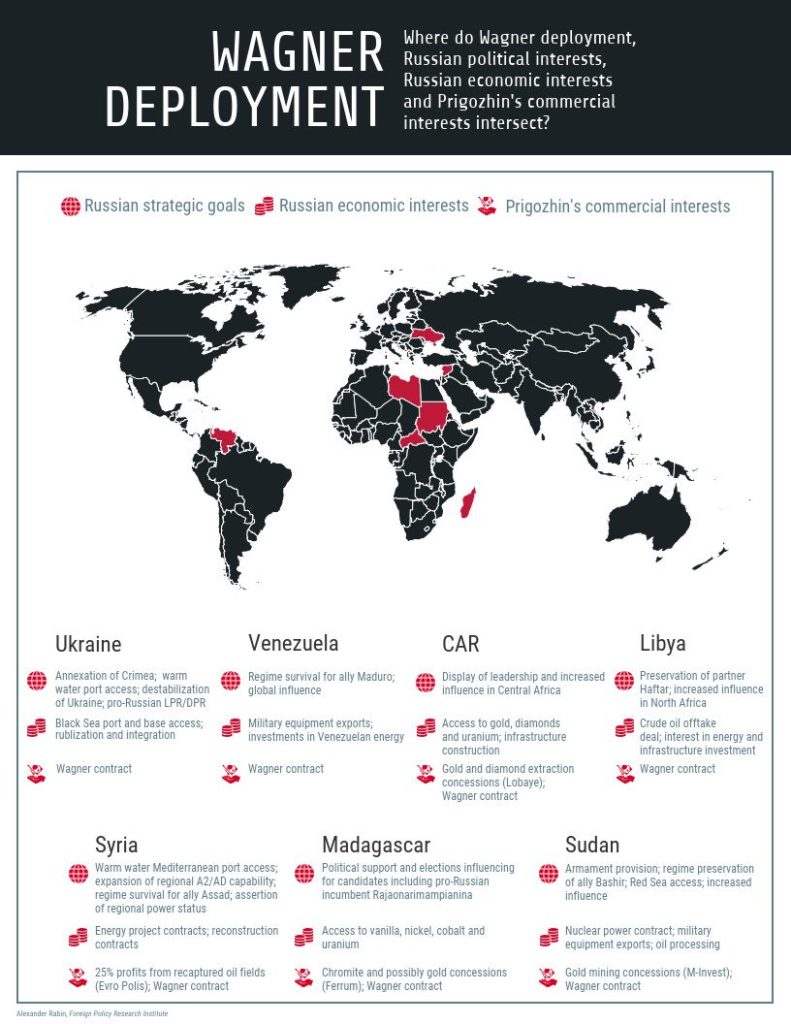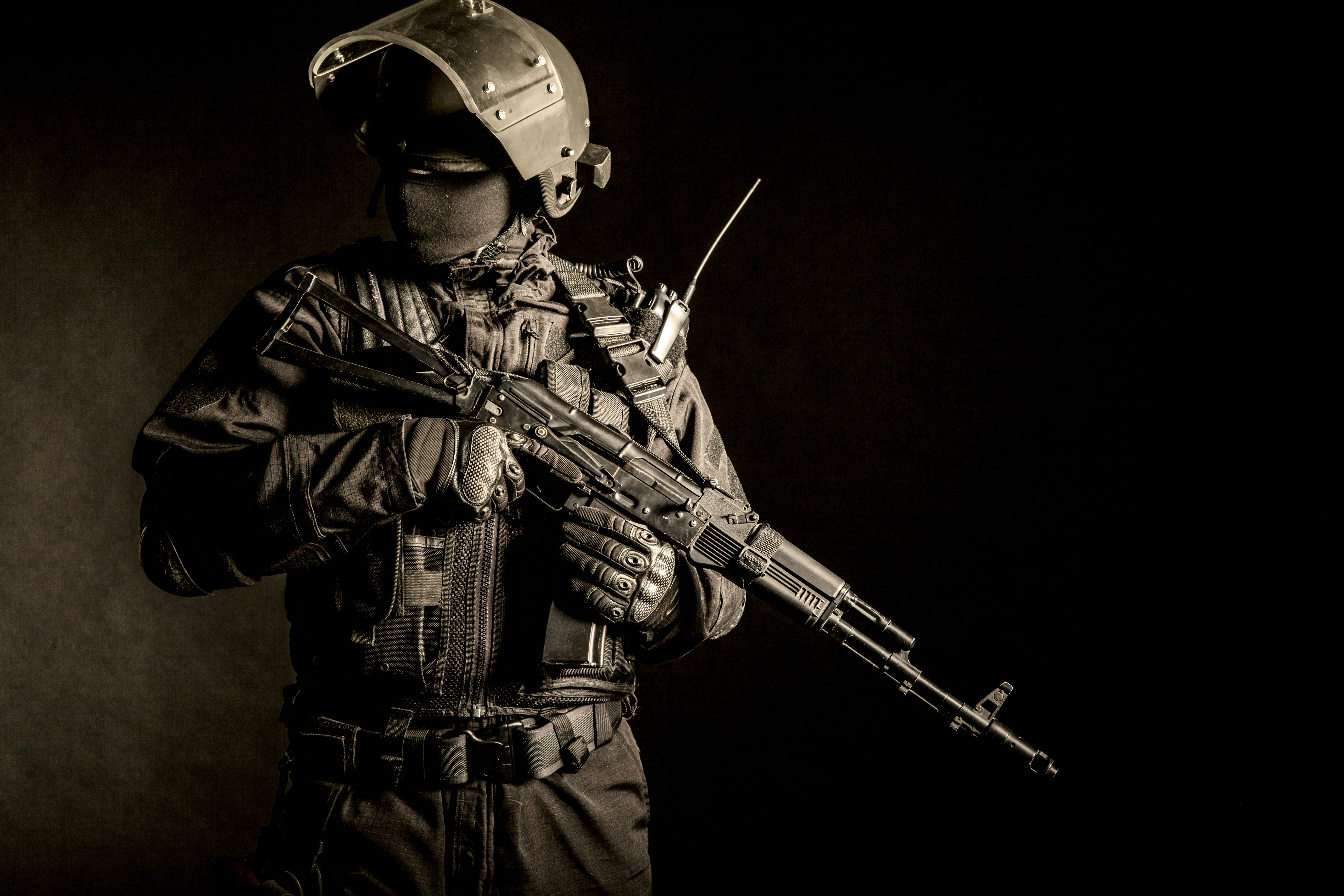A nation must think before it acts.
Many expected the diplomatic relationship between the Russian Federation and the United States to fray when U.S. forces killed hundreds of Russians assaulting a U.S.-held Syrian outpost in early 2018. Yet, the Kremlin quickly distanced itself from the Russian bodies on the far-off Syrian battlefield. These Russians fought on behalf of Syrian President Bashar al-Assad, but they didn’t wear uniforms of the Syrian or Russian militaries. Instead, they worked for entrepreneurial oligarch Yevgeny Prigozhin and his Wagner Group, a private military company.
Prigozhin is a familiar figure to Americans. Two months before his mercenaries died in Syria, Special Counsel Robert S. Mueller III indicted him for operating the Internet Research Agency, a disinformation troll farm that interfered in the 2016 U.S. presidential election. However, Prigozhin’s employees push Russia’s interests in a new era of hybrid warfare through direct combat and online manipulation. By pursuing Russian strategic objectives under a private banner, Wagner provides the Kremlin with a veil of plausible deniability, bolstering Russian diplomatic flexibility and minimizing the official casualty counts that could doom Russian involvement in domestically unpopular conflicts like the Syrian Civil War.
Who is Prigozhin and What is the Wagner Group?
Prigozhin’s knack for profit led him on an unconventional path into Putin’s confidence. After serving nine years in prison in 1990, he opened hot dog stands with his stepfather. As the Soviet Union folded and Russia’s private sector burgeoned, Prigozhin invested in St. Petersburg’s first grocery chain and eventually opened luxury restaurant New Island, where he first personally served Putin. Prigozhin has leveraged his lofty connections into billion-dollar military and public school catering and construction contracts since the mid-2000s, earning himself the nickname of “Putin’s chef.”
Wagner’s deep connections with Russia’s top political leaders distinguish the company from its contemporaries. The contractors’ appearance in geopolitical hotspots illuminates close coordination between Prigozhin’s commercial aspirations and the Kremlin’s pursuit of national interest. Prigozhin profits by providing services in the countries where Russia is expanding its engagement, while the state maintains plausible deniability by utilizing Prigozhin’s private structures. In the process, Prigozhin accumulates prestige and political capital, paving the way for future lucrative contracts.

The Wagner Group around the World
Wagner first surfaced during the Russian annexation of Crimea, assisting unidentifiable Russian military units, known as “little green men,” in bloodlessly securing territory and disarming Ukrainian military installations. The contractors then fought alongside pro-Russian separatists in Ukraine’s Donbas region. Wagner kept busy in the self-proclaimed Donetsk People’s Republic (DPR) and Luhansk People’s Republic (LPR), reportedly shooting down a Ukrainian Il-76 military airlift, assassinating rogue separatist leaders, and participating in the Battle of Debaltseve (2015).
Just after Russian support for Assad increased in 2015, Wagner troops became a crucial asset by, as in Ukraine, performing defensive and offensive roles. By guarding energy and military facilities, these contractors alleviated the personnel shortage that hindered Assad’s ability to simultaneously protect facilities and mount offensives to recapture territory. Wagner provided offensive manpower in battles like the Battle for Palmyra (2016), in which it supplied the initial shock force to reclaim the city from the Islamic State.
However, the Syrian case differs from the operations in Ukraine because of Prigozhin’s clear additional monetary incentive for increased Wagner deployment. His Evro Polis firm signed a contract with the Syrian state-owned General Petroleum Corporation around January 2018, granting Evro Polis 25% of the output from any petroleum facilities retaken for Assad. Wagner’s risky assault on the Deir ez-Zor Conoco outpost occurred a mere month after the Evro Polis deal, and phone calls intercepted by U.S. intelligence reveal Prigozhin participated directly in planning the attack.
Yet, the degree of command the Russian state exercises over Wagner in Syria remains unclear. While some sources close to the Defense Ministry claim Wagner’s disastrous offensive on the Conoco outpost blindsided the military, others allege the Kremlin likely authorized the attack. Still yet, others claim Wagner coordinates with the Defense Ministry but does so loosely, which could explain a failure to secure approval for one specific offensive.
Similarly, as Russia increases its involvement in Africa, Wagner operations have expanded across the continent, where it protects Prigozhin’s investments. In late 2017, videos of Russian contractors training Sudanese troops circulated on Twitter, while around 300 contractors were reportedly in the country. Around the same time, the company M-Invest, which Prigozhin is rumored to own, secured mining concessions from the Sudanese government. Wagner fighters now guard these mines. While M-Invest is registered as a resource extraction company, it also furnished former Sudanese President Omar al-Bashir, a Russia-friendly leader who presided over numerous bilateral trade deals, with a blueprint for suppressing the Khartoum protests of early 2019. The firm proposed smear campaigns and social media weaponization reminiscent of Prigozhin’s Internet Research Agency.
Russian involvement in the neighboring Central African Republic (CAR) also links political support with economic gain. Russia outhustled France to obtain an exception to the United Nations CAR arms embargo in 2018, and Wagner contractors entered the country around the same time, allegedly providing security for President Faustin-Archange Touadera. While Russia hopes to appear as a source of regional stability, this aid does not come free; the CAR has abundant reserves of diamonds, oil, gold, and uranium, and the Russian Foreign Ministry has discussed mining concessions with Touadera. Although Russia has ingratiated itself with Touadera, it has also met with CAR’s rebel groups, playing the field to obtain access to resource-rich territory. Lobaye Invest, an M-Invest subsidiary, has already initiated diamond extraction, and Wagner contractors again appear to guard the mines. The dividends inherent in Prigozhin’s role in Russian geopolitics are paying off, and Wagner provides the muscle to defend them.
Notably, three Russian journalists investigating Wagner’s presence in the CAR were murdered in the summer of 2018. The slain journalists were tracking Wagner, but on the date of their deaths, they intended to film the Ndassima gold mines, which Prigozhin planned to exploit. Phone records show the journalists’ driver frequently contacted a CAR police officer with close ties to Wagner, including phone calls on the day of the murder.
As Wagner has successfully protected Russian interests and filled Prigozhin’s coffers, the Kremlin has relied more heavily on the contractors. In 2018, Moscow worked hard to influence elections in Madagascar—and Prigozhin again provided the means. The oligarch sent political consultants, who supported Russia-friendly incumbent Hery Rajaonarimampianina and other candidates, but he also deployed Wagner contractors to guard these consultants. Prigozhin evidently identified Madagascar’s resources as another source of personal profit. Under Rajaonarimampianina’s presidency, Madagascar’s state-owned chromite mining company, KRAOMA, entered a controversial joint venture with Ferrum Mining, a Russian company linked to Prigozhin’s commercial empire. Under a 2018 contract, Ferrum received funds from Broker Expert, a company nestled into a system of interest-bearing loan agreements between many of Prigozhin’s companies, including Concord Management and Consulting, M-Invest, M-Finance, and Megaline. The Madagascar case presents another quintessential linkage of Russian ambitions and Prigozhin’s political manipulation.
In November 2018, evidence emerged of Prigozhin’s partnership with the Kremlin in another strategic location: Libya. Remarkable footage shows Prigozhin sitting among prominent Russian defense officials during a meeting with Libyan National Army (LNA) personnel. Months later, reports materialized of Wagner mercenaries supporting the LNA, whose leader, Field Marshal Khalifa Haftar, the Kremlin has quietly but steadily backed. Russia has displayed interest in Libyan energy resources, including a 2017 oil offtake deal, and it will likely pursue further investment as opportunities for Libyan conflict resolution emerge.
The Kremlin, increasingly viewing Wagner as a diplomatic asset, deployed contractors to Venezuela in early 2019. As beleaguered leader Nicolas Maduro began to fear defections from his security personnel, Wagner provided guards. This move reflects the Russian state-owned oil giant Rosneft’s multi-billion dollar investments in Venezuelan oil, as well as Russia’s massive arms export deals.
Linkages between Wagner and the Russian State
Russia’s command structure for Wagner remains murky, but its support materializes in three forms: funding, equipment, and training.
Prigozhin and the Wagner Group have complicated relationships with the Russian state and other governments. Red nodes represent companies linked to Prigozhin’s commercial empire, while black nodes represent entities linked to state governments.
The source of Wagner’s funds remains unclear, with only anecdotal evidence offering insight. Prigozhin apparently diverted significant revenue from his construction and catering contracts to establish Wagner. The company’s annual costs, reportedly totaling up to $150 million around 2016 in Syria alone, require funding beyond the reasonable capacity of Prigozhin’s logistics businesses, but these companies present ideal conduits for funneling funds into Wagner from the state.
While concrete monetary connections remain elusive, Moscow clearly plays a crucial role in arming Wagner. Ukraine’s Security Service (SBU) claims Wagner receives equipment like tanks, Grad rocket launchers, and armored vehicles without cost. Footage of Wagner contractors reveals they operate vehicles typically reserved for the Russian Armed Forces, such as the Vystrel all-terrain vehicle. Multiple contractors claim they flew to Syria on Russian military transport aircraft. These stories align with the SBU’s allegations that contracts between M-Invest and Ministry of Defense flight units indicate Prigozhin leases military aircraft for contractors.
The state—particularly the Main Directorate of the General Staff (GRU)—plays a major role in Wagner’s training. The contractors train at a GRU compound in Molkino, a village in southwestern Russia, and the SBU has identified over 25 Russian officers who instruct Wagner contractors in skills ranging from artillery to combat engineering. The GRU often directs and supports the group in combat, and the available evidence indicates close coordination in Ukraine. In the LPR, GRU officer Oleg Ivannikov helped to command Wagner; intercepted phone calls reveal Ivannikov coordinated operations with Wagner commander and former GRU Lieutenant Colonel Dmitry Utkin during the Battle of Debaltseve.
Fusing Geopolitical Pursuits and Private Enterprise
Through Wagner, Russia offers military support or political stabilization in return for political influence, opportunities for geostrategic expansion, or resource concessions. Wagner can be considered a private military company only to the extent that it feeds the wealth of a private individual, but the reality of its integration into Russian command structures renders it an entirely different animal. Despite Wagner’s ostensibly private nature, Putin has thanked the contractors for their services, awarding top commanders like Utkin state military honors, constructing statues of Wagner contractors in Syria and Donbas, and posing for photographs with commanders. Prigozhin has received no gleaming military awards or monuments, but by deploying Wagner across three continents, Putin has thanked him by facilitating the global extension of his commercial reach.
The international community should familiarize itself with Prigozhin’s name. As long as leaders of politically unstable countries agree to work with Putin and offer sources of profit for Prigozhin, this model fusing geopolitical pursuits and private enterprise will endure.



